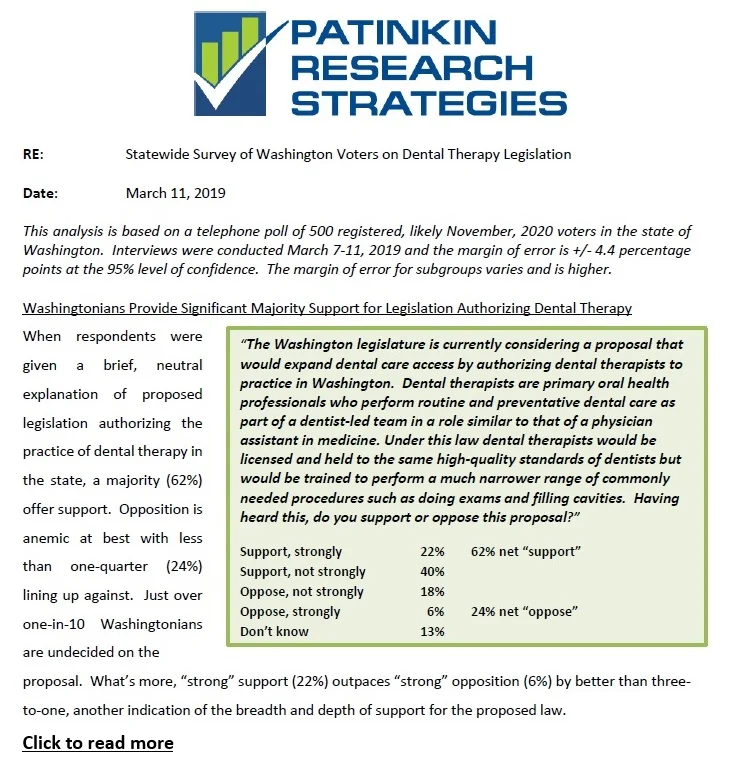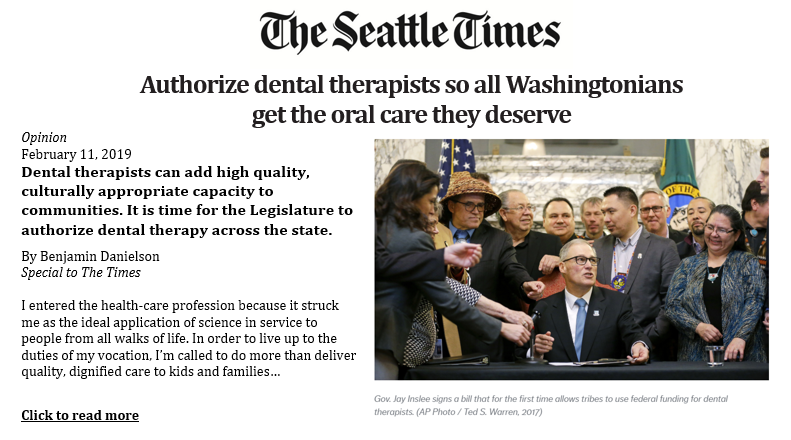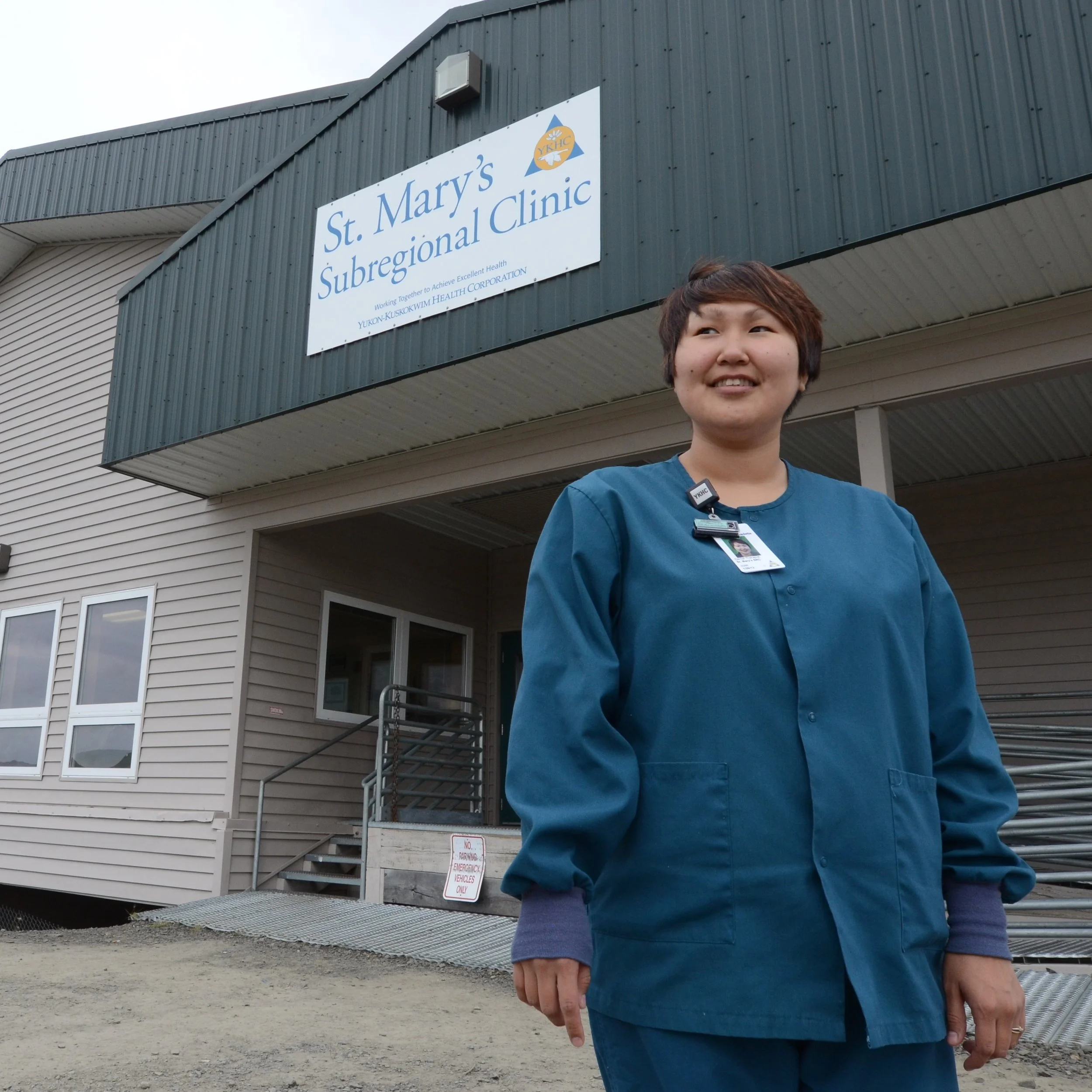press release: Governor Inslee Signs Dental Therapy Bill Into Law
Governor Jay Inslee signed House Bill 1678 into law today to allow dental therapists to practice in community health centers statewide, providing Washingtonians access to primary dental care providers who deliver routine and preventative care under a dentist’s supervision. Continue reading.
OPINION | Washington Lawmakers Must Expand Dental Therapy for Underserved Communities
Cheryl Berenson, R.N., M.S., M.P.H. shares her experience working with unhoused adults and children, and how dental therapy could help get them the oral health care they need. Continue reading in the South Seattle Emerald.
Swinomish tribe wins court battle over funding for dental therapists
The Swinomish Indian Tribal Community and the state of Washington have won a court battle that will now allow federal Medicaid funding for dental therapists working in state tribal communities. Continue reading in at Go Skagit.
LETTER TO THE EDITOR: Dental therapist model helps expand care
“In my 40 years as director of Sea Mar’s dental services, meeting the demand for oral health care has remained a challenge… Fortunately, the state Legislature has the opportunity to move a solution forward, such as expanding dental therapy statewide.” - Alex Narváez, DDS, vice president of Dental Affairs and chief dental officer, Sea Mar Community Health Centers, Seattle. Continue reading in the Seattle Times.
Swinomish tribe, Skagit Valley College partner on new dental therapy program
Skagit Valley College’s Dental Therapy Education Program and the Swinomish tribe are jointly launching the first program in the state to train dental therapists. Continue reading in the Seattle Times.
OP-ED: Proposal can bridge gaps for those who need dental care
Jeromy Sullivan, Tribal Chairman and Jolene Sullivan, Director of Health Services, both enrolled members of the Port Gamble S'Klallam Tribe, describe the positive impacts they’ve seen dental therapists make in Tribal communities. Continue reading the in the Kitsap Sun.
OP-ED: ALLOWING DENTAL THERAPISTS WOULD IMPOVE KIDS’ CARE
Former state Representative Ruth Kagi urges the legislature to authorize dental therapy statewide and improve oral health access for children. Continue reading in the Everett Herald.
LETTER TO THE EDITOR: DENTAL THERAPISTS ARE A WIN FOR EVERYONE
“My daughter is not able to afford dental care. It is a luxury for those of us with jobs that have dental care insurance.” April May shares her personal experience with oral health access. Continue reading in the Spokesman-Review.
OP-ED: ALLOW DENTAL THERAPISTS TO PRACTICE STATEWIDE
Dr. Sarah Hill, a dentist at the Seattle Indian Health Board, shares how her professional experience, and the time she spent serving on the Dental Therapy Task Force informed her belief that dental therapists should be added to the oral health care team. Continue reading in the Seattle Times.
OP-ED: WASHINGTONIANS DESERVE BETTER DENTAL CARE, AND DENTAL THERAPY IS THE ANSWER
Marcy Bowers, Executive Director of the Statewide Poverty Action Network, calls on lawmakers to reject the fear-mongering tactics of the Washington State Dental Association and authorize dental therapy statewide this legislative session. Continue reading in Real Change.
OP-ED: PIERCE COUNTY DOESN’T HAVE ENOUGH DENTISTS. LAWMAKERS MUST EXPAND ACCESS TO ORAL HEALTH
Dr. Alex Narváez, DDS (Director of Dental Services at Sea Mar Community Health Centers) shares how dental therapy creates career opportunities in health care for under-represented communities. Continue reading in The News Tribune.
DENTAL THERAPY TASK FORCE RELEASES FINAL REPORT TO LEGISLATURE
Established by the state legislature in the 2021 session, the Dental therapy Task Force has been meeting for the past few months to put forth proposals to expand the practice of dental therapy statewide. The final report shows that most members clearly favored the policies to expand dental therapy statewide that were supported by evidence of safety, effectiveness, and ability to best serve those Washingtonians in need of care. Read the full report.
PRESS RELEASE: TASK FORCE AIMS TO BRING DENTAL CARE TO MORE WA COMMUNITIES
Olympia, WA—State lawmakers are creating a task force to analyze how to bring the successful practice of dental therapy, currently only authorized on Washington tribal lands, to scale statewide.
The task force, composed of dental professionals, health providers, and tribal and consumer representatives, will study how dental therapists can expand access to oral health care in more underserved communities. Continue reading.
"Dental pain has followed me my entire life."
Benita Presley, chair of the NAACP Vancouver’s Health Committee, urges Washington legislators to authorize dental therapists. Continue reading.
State budget cuts loom, starting with dental benefits
Cutting Medicaid adult dental: “what they’re failing to recognize is that oral health is integral to systemic overall health.” Continue reading.
Swinomish dental therapists keep people safe with outdoor clinics
“As COVID-19 sweeps through our country, I can not imagine a better choice than becoming a dental therapist.” Continue reading.
Inga Weddle brings unique experiences to Tulalip tribe
Inga Weddle on her decision to become a dental therapist: “Providing safe and affordable care is what inspired me. Having more providers lets us get ahead of the decay and do more prevention so that more people are happy to come to the dentist and take care of their oral health.” Continue reading
DENTAL THERAPY ON THE SWINOMISH RESERVATION
“Washington state needs a cost-effective and community-focused workforce now more than ever. The good news is that tribes like the Swinomish are showing how dental therapy can make dental care easier to access and afford.” Continue reading
COLVILLE DENTAL THERAPISTS LEAD THE WAY FOR INNOVATIVE DENTAL CARE DURING PANDEMIC
“Growing up on the Colville Reservation, my friends and family only visited the dentist for emergencies.” Continue reading
EAST COAST’S FIRST DENTAL THERAPIST TO BEGIN WORK
The first dental therapist on the East Coast will begin working in Bangor, Maine, six years after a state law passed allowing dental therapists to practice. Continue reading
BACKERS OF RURAL DENTAL CARE FIND SOMETHING TO SMILE ABOUT
It can be hard to keep smiles healthy in rural areas, where dentists are few and far between and residents often are poor and lack dental coverage. Efforts to remedy the problem have produced varying degrees of success. The biggest obstacle? Dentists. Continue reading
COALITION OF PROMINENT DENTISTS LAUNCHES UNIFIED PLATFORM TO ADDRESS HEALTH EQUITY
Today, a distinguished group of dentists with extensive backgrounds in private practice, public health, dental education, administration and research, announced the formation of The National Coalition of Dentists for Health Equity to advance comprehensive health equity with a specific focus on assuring oral health equity and increasing access to care. Continue reading
DENTAL THERAPISTS ARE A CRUCIAL TOOL FOR ENDING WASHINGTON’S DENTAL HEALTH SHORTAGE
For states with a lack of dental services, there is a simple solution to these problems that would expand dental care access and lower costs: dental therapists. Continue reading
POLL: WASHINGTON VOTERS SUPPORT DENTAL THERAPY
FOR IMMEDIATE RELEASE
Wednesday, March 13, 2019
OLYMPIA—Washington voters support the Legislature authorizing dental therapy this year, according to a statewide poll released today by the Washington Dental Access Campaign.
The state legislature is currently considering House Bill 1317, a measure that would allow dental therapists to practice and be trained in Washington state.
The poll, conducted by Patinkin Research Strategies March 7-11, shows 62 percent of Washington voters in support of dental therapy to provide routine, preventive oral health care.
A summary of the poll findings are available below and at http://bit.ly/DentalTherapyPoll.
Support was strong in rural, suburban and urban areas. Democrats, Republicans and independent voters all favored the bill by 36- to 39-point margins.
“Oral health care’s newest innovation is not only urgent—it’s popular,” said Jon Gould, deputy director of Children’s Alliance. “From Long Beach to Lynden, Pullman to Port Angeles, voters all across our state want lawmakers to bring dental therapy to Washington consumers.”
For too many Washington families, timely and routine oral health care is out of reach. In 38 of the state’s 39 counties, too few dental professionals are meeting local needs.
By authorizing dental therapists, House Bill 1317 will expand dental care access where it is needed most, providing timely, quality care to rural and low-income communities and communities of color and to patients who are publicly insured or uninsured.
The bill passed the House Health Care and House Appropriations committees. The bill is not subject to the March 13 House of Origin cutoff, according to designation by the Speaker of the House.
Washington voters’ support of dental therapy is a reflection of support for dental therapy nationwide. Guided by national standards adopted by the same agency that sets standards for dentists, dental therapists have been practicing safely and effectively in the United States for 15 years and are authorized or working in eight states, including on Washington’s tribal lands.
Under House Bill 1317, dental therapists would be licensed in Washington and held to the same high-quality standards as dentists, but trained to perform a much narrower range of commonly needed procedures.
Dental therapists are already working in Washington; the Swinomish Indian Tribal Community licensed their own dental therapist in 2016, and in 2017 state lawmakers authorized dental therapists to work on tribal lands throughout the state. Dental therapists have since been hired by the Port Gamble S’Klallam Tribe and the Lower Elwha Klallam Tribe. Six students from the Confederated Tribes of the Colville Reservation, Lummi Nation, Swinomish Indian Tribal Community, and Tulalip Tribes are studying in Alaska; they will complete their educations and return to serve their communities over the next two years.
Dr. Luke E. Adams is dental director at the Seattle Indian Heath Board. “I have met the dental health aide therapists (DHATs) trained in Alaska and I have seen their work,” he said. “I am satisfied that DHATs can deliver safe and effective dental therapy. I am impressed, however, with the variety of innovative practices that DHATs are using to improve public health.
“Importantly, the trained DHATs are typically born and raised in rural and underserved areas and are returning to these communities to practice. I would like all Washington State residents to benefit from the increased access to care that DHATs have demonstrated.”
By increasing access to care, dental therapists can address the racial and economic disparities in the oral health care system.
People of color are less likely to receive routine and preventive care, and children of color have the highest rates of dental decay and the fewest experiences with a dental professional. People with special needs, elderly people in nursing homes, parents in low-income families and communities of color, and people who live in rural and tribal communities are also feeling the worst effects of our shortage of dental providers.
Approximately half of Washington kids receive their health coverage from Apple Health for Kids, but only 29 percent of Washington dentists will take their insurance. As a result, nearly 400,000 Washington children covered by Apple Health for Kids do not see a dentist each year.
“These unequal conditions are preventable,” said Gould. “It’s high time lawmakers stepped up to adopt dental therapy statewide.”
Convened by Children’s Alliance, the Washington Dental Access Campaign unites more than 40 organizations, including health care associations, consumer advocates, dentists, dental hygienists, senior groups, tribal governments and educational institutions to push for statewide dental therapy to address Washington’s oral health care needs. Learn more at www.wadentalaccess.com.
###
FOR IMMEDIATE RELEASE
January 22, 2019
OLYMPIA—Legislators have a solution to Washington state’s shortage of oral health providers: authorize dental therapists to work all across the state.
For too many Washington families, timely and routine oral health care is out of reach. In 37 out of the state’s 39 counties, too few dental professionals are meeting local needs.
“Every child and family needs timely, preventive health care to be at their best,” said Jon Gould, deputy director of Children’s Alliance. “Childhood experiences with tooth decay disrupt sleep, school performance, and a healthy diet. When a child’s mouth hurts, it’s hard to eat healthy or sit still in class.”
“Infections of the oral cavity have systemic consequences. An untreated cavity can cause chronic, potentially life-threatening conditions and a visit to the emergency room,” said Jennifer Zbaraschuk, a Sequim hygienist and president of the Washington Dental Hygienists’ Association. “Families need to see a dental professional long before that.”
By authorizing dental therapists, House Bill 1317 / Senate Bill 5392 will expand dental care access where it is most out of reach, providing timely, quality care to rural, low-income communities and communities of color, and to patients who are publicly insured or uninsured. The bill is sponsored by Sen. David Frockt (D-46) and Rep. Eileen Cody (D-34).
“We need to act—we can’t wait any longer—to modernize the oral health care system,” said Rep. Cody, Chair of the House Health Care & Wellness Committee. “Dental therapists offer a way to connect more kids and families with urgently needed oral health care.”
Guided by national industry-approved standards, dental therapists have been practicing safely and effectively in the United States for more than 10 years. Since 2016, Arizona, Maine, Vermont and Michigan have all followed Alaska and Minnesota in passing legislation allowing dental therapists to practice. Under HB 1317 / SB 5392, they would be licensed in Washington and held to the same high-quality standards as dentists, but trained to perform a much narrower range of commonly needed procedures.
Dental therapists are already working in Washington; the Swinomish Indian Tribal Community licensed their own dental therapist in 2016, and in 2017 state lawmakers authorized dental therapists to work on tribal lands throughout the state. Dental therapists have since been hired by the Port Gamble S’Klallam Tribe and the Lower Elwha Klallam Tribe. Six students from the Confederated Tribes of the Colville Reservation, Lummi Nation, Swinomish Indian Tribal Community, and Tulalip Tribes are studying in Alaska to become dental therapists; they will complete their educations and return to serve their communities over the next two years.
Last year, a comprehensive study by the University of Washington found that dental therapists in Alaska were decreasing adverse outcomes. For example, fewer children in the rural Native communities they served needed their four front teeth extracted, or needed other procedures requiring anesthesia.
Dental therapists also allow dentists and oral health clinics to expand their business. Adding just one dental therapist means a dental practice can take 2,000-3,000 more appointments a year—and leverage state dollars earmarked for clinics in underserved rural communities.
By increasing access to care, dental therapists can address the racial and economic disparities in the oral health care system.
People of color are less likely to receive routine and preventive care, and children of color have the highest rates of dental decay and the fewest experiences with a dental professional. People with special needs, elderly people in nursing homes, parents in low-income families and communities of color, and people who live in rural and tribal communities are also feeling the worst effects of our shortage of dental providers.
Approximately 1 in 2 Washington kids have the popular, cost-effective Apple Health for Kids coverage. Yet our state’s dental practices accept their form of coverage 30 percent less often than practices nationwide. As a result, nearly 400,000 Washington kids covered by Apple Health do not see a dentist each year.
“Kids and families are facing harmful inequities in access to care,” said Sen. David Frockt, sponsor of the Senate bill. “They urgently need us to fix them.”
“These unequal conditions can’t be ignored,” said Gould. “It’s high time we adopted this proven solution.”
Convened by Children’s Alliance, the Washington Dental Access Campaign unites more than 40 organizations, including health care associations, consumer advocates, dentists, dental hygienists, senior groups, tribal governments and educational institutions to push for statewide dental therapy to address Washington’s oral health care needs.



